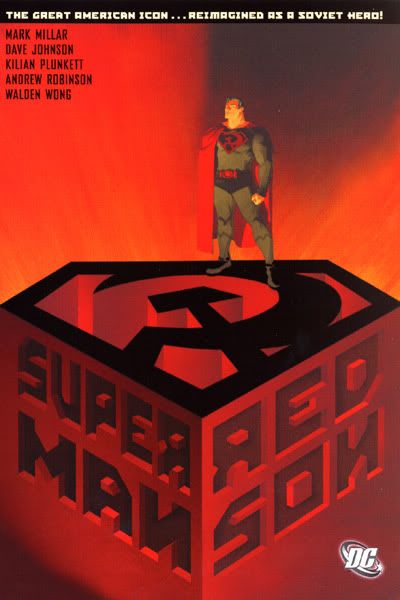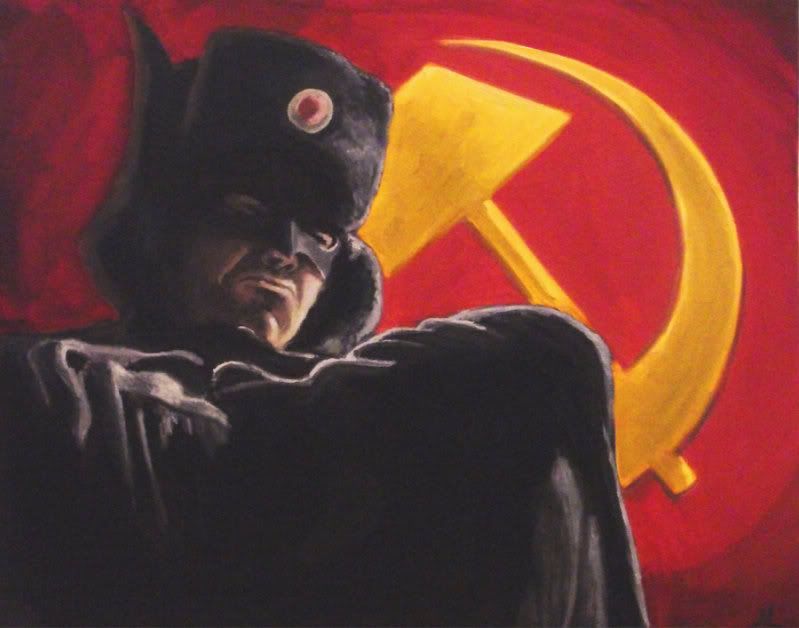This is the idea behind "Red Son"

As you might surmise from the cover art, "Red Son" is an alternate universe story, based on the "what if" world where superman lands in Siberian Russia rather than rural Kansas. Instead of being raised in the wholesome, All American setting of Smallville, he is raised by poor Russian farmers, and holds The Party's ideals near and dear to his heart.
The story doesn't proceed as one might expect, however. It does not cast Superman as a villain. Nor does the story only recognize Superman as a hero after he rejects communism and all its evils. The writers skillfully crafted a more nuanced tale, respecting the philosophical ideals which can lead to a person embracing communism, while simultaneously pointing out the fundamental flaws both historical and theoretical. And this was done not only for Communism, but for capitalism as represented by the United states as well.
Superman is held up as the ideal result of the communist philosophy, a true comrade who believes every man and woman is equal. It is ironic that superman's boy-scout nature is precisely what allows this book to emphasize the ethical ambiguities of governance. He is a hero who epitomizes philosophies which history has taught us to view as more villainous than they might actually be.
All of the characters are more three dimensional than they are normally portrayed, in matter of fact. Lex Luthor, cast as America's answer to the new Russian super weapon, begins the tale as an eccentric genius who grabs the reader's attention merely because his genius is taken to laughable extremes. Moving forward, he shifts into a more traditional role as a mad scientist, albeit a state-endorsed mad scientist with motivations the reader can sympathize with. In the final act the character transforms once more, as his drive to defeat superman begins to be expressed more coherently. As the story entered its final act, I found that I had switched sides, and was now firmly in Luthor's camp, rooting for him to best the comrade of steel.
Other characters in the DC Universe appear as well, and so well crafted are their inclusions that it never quite feels like a cameo. Batman, Wonder Woman, and Hal Jordan (Green Lantern) all appear in the tale; sometimes assisting, sometimes opposing their old chum Superman. (In soviet Themyscira, man rule YOU!) Like Superman and Luthor, each character contributes their own perspective to the story, further fracturing any moral certitude the reader might have. Wonder Woman and Batman in particular serve as superb foils for Superman. They reflect on his successes and failures via their opposition to him as an evil dictator, or their admiration of him as a peacemaker. Plus, nothing can top Batman's new hat:

This abundance of ambiguity regarding who has governance and morality "right" isn't swept under the rug at the end of the story, either. Yes, somebody wins, and that person guides the world into a future based on their own vision of what is right. But there is no true triumph of The American Way over the dirty commies. Eventually, after a long drawn out battle which sometimes plays out more like a debate, everything is resolved and "The Global United States" is formed. Yet even that seemingly decisive vote for capitalism is qualified when the president says, while walking through the fortress of solitude, "Superman [...] had some surprisingly good ideas here, boys." Utopia comes about only after the best of both philosophies are combined.
Perhaps the greatest praise I can offer to this comic book is that the following day, I repeatedly thought I had seen a very good movie the previous evening. Only after spending a moment trying to remember what the movie had been about did I remember that it was "Red Son" I was thinking of.
If you have even a slight interest in comic books, the collection which tells this story is more than worth the $12.23 price tag.
No comments:
Post a Comment
Note: Only a member of this blog may post a comment.